|

Global India Foundation is a not-for-profit research organization premised on promoting national resilience and international interdependence within the broad spectrum of economic prosperity liberal values and social commitment. In keeping with its mandate of cooperative research endeavors and public dissemination, the Foundation has taken up a major research project under the title of Towards an Indian Century: Prospects and Challenges to explore the most important aspects and dimensions of India’s emergence as a global player pinpointing its strategic implications. As a part of the project a conference was held in 6 August, 2015 at the Turiyananda Hall of Ramakrishna Mission Institute of Culture, Kolkata, initiating varied discussion over the issue.
In the early decades of the 21st century, notwithstanding the post-Cold War turbulence, a nascent new world order is taking shape. An interconnected world of diverse interests needs constant and skilled nurturing of relations among major powers of the new order. In this milieu, while claims have already been made that the 21st century is essentially an “American Century”; counterclaims of an emerging “Asian Century” have also been forwarded. However, it can also be said that a defining moment has arrived for India that is poised to make strides towards a global power position.
With her increasing strategic and economic clout constituting immense potential for ‘Smart Power’, India, as it appears, will be a key player in this new world order. Indeed, the emergence of India as a global player is more of a reclamation of her ancient historical place in world politics. India’s commitment to democracy and her role as a responsible global actor over the ages have created a pool of soft power for her. Further, her increasing economic and military clout places her at the vanguard of the international community. So much so, an ‘Indian Century’ could be said to be just around the corner which may begin by 2050.
However, the prospects of India’s rise are also accompanied by numerous direct and indirect challenges that come on her way. The interplay and friction among her neighbouring countries, the parallel rise of China, India’s ingress into the echelons of influence by manoeuvring the global balance of power, the global fight against catastrophic terrorism, the changing complicities of nuclear proliferation dynamics, the intensified competition over the remaining energy resources, India’s increasing engagement in international organizations, the depletion of social cohesion in India as well as around the world aggravate the level of difficulties for her. Thus the main thrust of the conference remained focused on India and the Global Balance of Power: Strategic Implications. Considering the broader scope of the topic, eleven distinguished experts and scholars from across the country highlighted some of the most pertaining issues of contemporary international relations within the purview of the thematic.
The conference commenced from 10.00 in the morning with the inaugural session being chaired by Admiral P J Jacob, the Chairman of the Foundation. At the outset, introductory remarks were made by Prof. Anindya Jyoti Majumdar, the Convener and an EC member of GIF. Prof. Suranjan Das, Vice Chancellor of Jadavpur University, and Swami Suparnananda, the Secretary of RKM Institute of Culture, graced the occasion as the Guests of Honour. While Prof. Das threw light upon the significance and relevance of the theme, appreciating the initiative by the Foundation, Swami Suparnananda focused on the teachings of Swami Vivekananda to show how his ideas can create a bridge between Indian and non-Indian pools of thought highlighting the importance of Indian political thought in the realm of international politics. This session ended with a vote of thanks given by Prof. Omprakash Mishra, the Member Secretary of GIF.
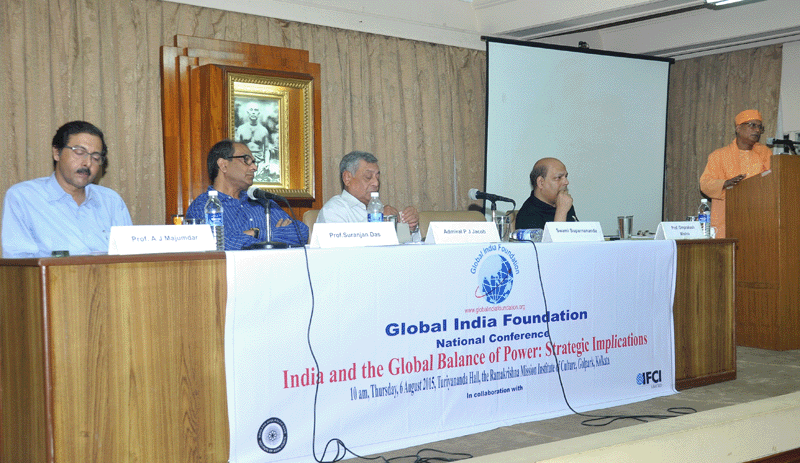
From left to right: Prof. Anindya Jyoti Majumdar, Prof. Suranjan Das, Admiral P J Jacob, Prof. Omprakash Mishra, Swami Suparnananda
The next session was chaired by an erudite Professor of the Department of International Relations, Jadavpur University, Prof. Purusottam Bhattacharya. In this session eminent specialists, Dr. C. Raja Mohan, Fellow of the Observer Research Foundation, Gen. A. S. Lamba, Member of GIF and the Former Vice-Chief of the Army, and Prof. Chintamani Mahaparta, Professor, Jawaharlal Nehru University, School of International Studies, expounded their scholarly expertise on ‘India and the Changing Global Order’, ‘Security Strategy in Geo-Political Theatres’ and ‘The US as the Fulcrum of Global Balance of Power’, respectively. By bringing to light the prospects for developing a new framework of India’s external engagement, Dr. Raja Mohan pointed out that the increase in India’s own material capabilities and her improving ties with all the major powers offer significant opportunities to elevate her regional and international standing as well as shape the global balance of power provided India overcomes the inertia of her foreign policy discourse. Gen. Lamba, keeping in mind the huge impact of the recent geopolitical transformations on India, focused on the three major geopolitical regions of the Indian Ocean, Eurasia and the South China Seas that have witnessed the most turbulence in the recent times. Prof. Mahapatra in his paper drew attention to the tenability of the argument of the US losing its position as the fulcrum of the global balance of power at the current rate of its relative decline and also addressed the question if China can be considered as a replacement to it.
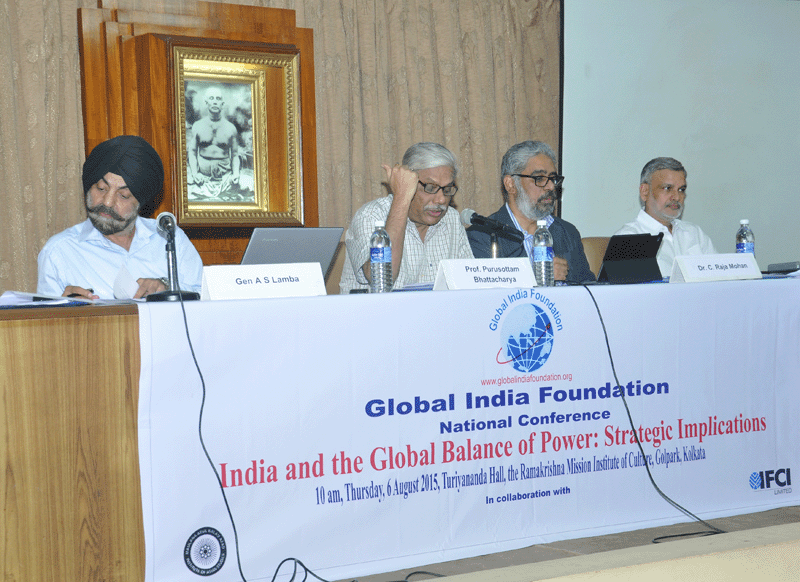
From left to right: Gen. A. S. Lamba, Prof. Purusottam Bhattacharya, Dr. C. Raja Mohan, Prof. Chintamani Mahaparta
The next session, gracefully chaired by Dr. Raja Mohan, had Admiral P J Jacob, Prof. Omprakash Mishra and Prof. Sanjukta Bhattachrya, Professor, Department of International Relations, Jadavpur University, speaking on ‘Maritime Security: the Indian Ocean Theatre’, ‘India’s Engagement with Africa’ and ‘‘Global South’ and ‘New World Order’’,respectively. Admiral Jacob mentioned that though India’s rich maritime tradition dates back to the 3rd millennium BCE, her continental mindset fails to perceive security seriously enough beyond her land borders and also stressed on the need of Indian policy makers to understand the strategic importance of the Indian Ocean region, and the role that India is destined to play in its affairs. Prof. Mishra’s presentation sketched India’s engagement with the 54 countries of the African continent by briefly analyzing India’s past association with Africa, outlining the major economic and development connect and emphasizing the spurt in mutuality in the backdrop of the India-Africa Forum Summits. He noted that while comparisons with China’s almost omnipresent status in Africa is popular and thus inevitable, India’s unique advantages in terms of diaspora, development partnership model and democracy places the country in good standing. In the final presentation of this session Prof. Bhattacharya problematized the terms ‘Global South’ and ‘New World Order’. Whereas the first suggests a monolithic ‘South’, which is far from the case today, the second makes a fluid situation in international politics and the international economy sound as a kind of already constituted world ‘order’. Keeping in mind the multilayered, plurilateral and increasingly polycentric power structure in today’s world, she coined a term: ‘pluripolar world’, despite the nebulous nature of its economic and political architecture.
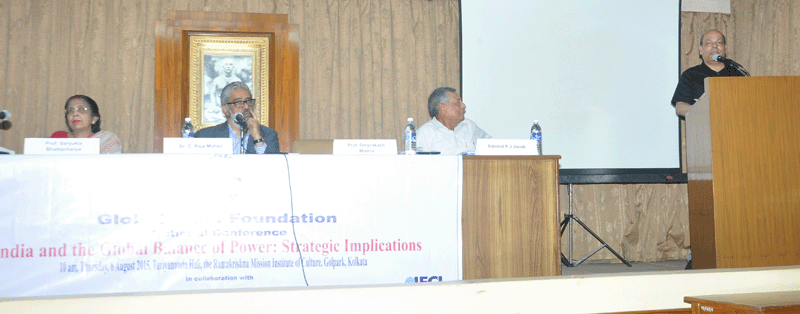
From left to right: Prof. Sanjukta Bhattachrya, Dr. C. Raja Mohan, Admiral P J Jacob, Prof. Omprakash Mishra
The second half of the conference was resumed post-lunch. Gen Lamba as an august chair of the third session had Dr. Anita Sengupta, Fellow at the Moulana Abul Kalam Azad Institute of Asian Studies, Prof. Partha Pratim Basu of the Department of IR, Jadavpur University and Prof. Shantishree Dhulipudi of the University of Pune respectively elucidating on ‘India and Eurasia’, ‘Afghanistan-Pakistan and India’ and ‘Assessment on the Global War on Terror’. Dr. Sengupta argued that while a ‘grand strategic vision’ may not be visible in India’s engagement with the Eurasian region there has been a pattern to India’s position with regard to Central Asia. According to her, it is within this context one needs to look into Prime Minister Modi’s visit to the region that included Russia as well as the five Central Asian states. As usual, connectivity, terrorism and energy security remains the recurring themes in discussions in this regard. Prof. Basu discussed the dynamics and prospects of India’s Afghanistan policy with the change of guard in Afghanistan in 2015. Recent developments like President Ashraf Ghani’s fresh dialogue with the Taliban, his leaning towards Pakistan and China’s growing interests in Afghanistan are, as he opined, some of the key factors in determining India’s position vis-à-vis Afghanistan. Prof. Dhulipudi noted that as the theater of the War on Terror has been in India’s immediate and extended neighborhood, this is redefining the Asian architecture of Power, where India as a swing state can sweep the balance to its favour. The presentation also explored how the presence or absence of the US from this theater can adversely affect India, with the combined strategic strength of China and Pakistan both out to contain India in Asia.
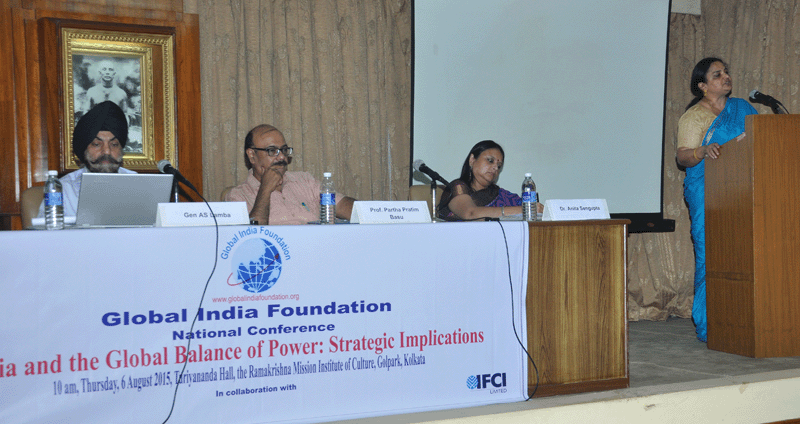
From left to right: Gen. A. S. Lamba, Prof. Partha Pratim Basu, Dr. Anita Sengupta, Prof. Shantishree Dhulipudi
The Chair of the final session of the conference was Prof. Chintamani Mahapatra with Prof. Anindya Jyoti Majumdar and Prof. Shibashis Chatterjee of the Department of IR, Jadavpur University, presenting papers on ‘Global Rebalancing and Asia’ and ‘Rise and Fall of ‘great powers’: Engaging Realist Theories of Change’. In his presentation, Prof. Majumdar asserted the necessity of re-balancing that pre-supposes that either a balance does not exist or whatever balance exists, it is lop-sided and seriously flawed. In a diffused balance, which is a feature of the contemporary world, the forerunners seek to consolidate their position and the cold war experience has shaped the general attitude towards a secure bipolar model. For him, an indication of contemporary re-balancing can be ascertained by asking who is to balance whom, when, where and how? The evolution of territorial militant terrorism as a physical military threat involving a war of attrition is also related to the re-balancing calculations. Under the circumstances, India's strategic moves would consider the militant terror threats as primary, relegating re-balancing to a long-term secondary goal. The final paper of the day presented by Prof. Chatterjee underscored that exploration and investigation of the different strategic implications of India and the global balance of power require us to go to the drawing board of basic theories in order to understand what is at stake in this debate and dialogue. He provided a broad realist theoretical perspective for the empirical examinations of India and the existing balance of power to follow.
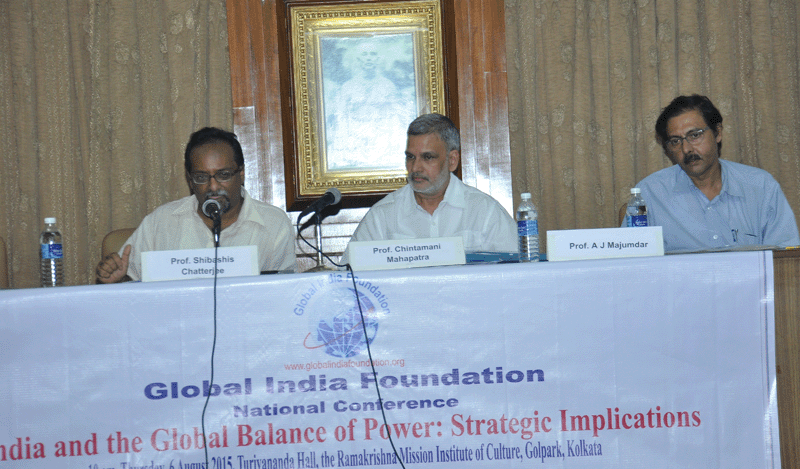
From left to right: Prof. Shibashis Chatterjee , Prof. Chintamani Mahapatra, Prof. Anindya Jyoti Majumdar
Finally, Prof. Mishra called it a day, acknowledging the various contributions of the scholars for making the conference a success.
|






